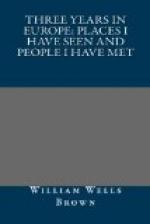But I must leave the good and hospitable people of the Scottish Capital for the present. I have taken an elaborate stock of notes, and may speak of Edinburgh again.
I left William and Ellen Craft (the latter of whom has just come to Edinburgh), and took the Glasgow train, and after a ride of two hours through a beautiful country, with its winding hills on either side—its fertile fields, luxuriant woods, and stately mansions lying around us, arrived in the muddy, dirty, smoky, foggy city of Glasgow. As I had had a standing invitation from a distinguished gentleman with whom I became acquainted in London, to partake of his hospitality, should I ever visit Glasgow, and again received a note while in Edinburgh renewing the invitation, I proceeded to his residence at Partick, three miles from Glasgow. This is one of the loveliest spots which I have yet seen. Our mansion is on the side of Laurel Bank, a range of the Kilpatrick hills. We have a view of the surrounding country.
On Monday evening, Jan. 6, a public meeting was held in the City Hall, to extend a welcome to the American fugitive slaves. The hall, one of the largest in the kingdom, was filled at an early hour. At the appointed time, Alex. Hastie, Esq., M.P., entered the great room, followed by the fugitives and most of the leading abolitionists, amid rapturous applause. With a Member of Parliament in the chair, and almost any number of clergymen on the platform, the meeting had an influential appearance. From report, I had imbibed the opinion that the Scotch were not easily moved, but if I may judge from the enthusiasm which characterised the City Hall demonstration, I should place them but little behind the English. After an excellent speech from the Chairman, and spirited addresses from several clergymen, William Craft was introduced to the meeting, and gave an account of the escape of himself and wife from slavery, and their subsequent flight from Boston. Any description of mine would give but a poor idea of the intense feeling that pervaded the meeting. I think all who were there, left the hall after hearing that noble fugitive, with a greater abhorrence of American slavery than they previously entertained.
LETTER XIV.
Stirling—Dundee—Dr. Dick—Geo. Gilfillan—Dr. Dick at home.
PERTH, SCOTLAND, Jan. 31, 1851.
I am glad once more to breathe an atmosphere uncontaminated by the fumes and smoke of a city with its population of three hundred thousand inhabitants. In company with our friends Wm. and Ellen Craft, I left Glasgow on the afternoon of the 23d inst., for Dundee, a beautiful town situated on the banks of the river Tay. One like myself, who has spent the best part of an eventful life in cities, and who prefers, as I do, a country to a town life, feels a greater degree of freedom when surrounded by forest trees, or country dwellings, and looking upon a clear sky, than when




